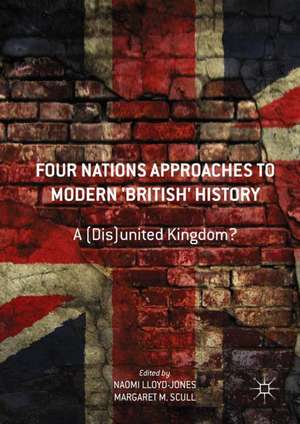Four Nations Approaches to Modern 'British' History: A (Dis)United Kingdom?
Editat de Naomi Lloyd-Jones, Margaret Scullen Limba Engleză Hardback – 8 noi 2017
This collection brings together leading and emerging scholars to evaluate the viability of four nations approaches to the history of the United Kingdom from the eighteenth to the twentieth century. It recognises the separate histories of England, Ireland, Scotland and Wales and explores the extent to which they share a common, ‘British’ history. They are entwined, with the points at which they interweave and detach dependent upon the nature of our inquiry, where we locate our ‘core’ and our ‘periphery’, and the ‘cause’ and ‘effect’ of our subject.
The collection demonstrates that four nations frameworks are relevant to a variety of topics and tests the limits of the methodology. The chapters illuminate the changing shape of modern British history writing, and provide fresh perspectives on subjects ranging from state governance, nationalism and Unionism, economics, cultural identities and social networking.
| Toate formatele și edițiile | Preț | Express |
|---|---|---|
| Paperback (1) | 525.01 lei 6-8 săpt. | |
| Palgrave Macmillan UK – 30 ian 2019 | 525.01 lei 6-8 săpt. | |
| Hardback (1) | 699.77 lei 6-8 săpt. | |
| Palgrave Macmillan UK – 8 noi 2017 | 699.77 lei 6-8 săpt. |
Preț: 699.77 lei
Preț vechi: 823.26 lei
-15% Nou
Puncte Express: 1050
Preț estimativ în valută:
133.90€ • 140.16$ • 111.45£
133.90€ • 140.16$ • 111.45£
Carte tipărită la comandă
Livrare economică 31 martie-14 aprilie
Preluare comenzi: 021 569.72.76
Specificații
ISBN-13: 9781137601414
ISBN-10: 1137601418
Pagini: 348
Ilustrații: XV, 274 p. 5 illus.
Dimensiuni: 148 x 210 x 22 mm
Greutate: 0.5 kg
Ediția:1st ed. 2018
Editura: Palgrave Macmillan UK
Colecția Palgrave Macmillan
Locul publicării:London, United Kingdom
ISBN-10: 1137601418
Pagini: 348
Ilustrații: XV, 274 p. 5 illus.
Dimensiuni: 148 x 210 x 22 mm
Greutate: 0.5 kg
Ediția:1st ed. 2018
Editura: Palgrave Macmillan UK
Colecția Palgrave Macmillan
Locul publicării:London, United Kingdom
Cuprins
PART I: METHODOLOGY.- 1. A New Plea for an Old Subject? Four Nations History for the Modern Period; Naomi Lloyd-Jones and Margaret Scull.- 2. J.G.A. Pocock and the Politics of British History; Ian McBride.- 3. ‘A Vertiginous Sense of Impending Loss’: Four Nations History and the Problem of Narrative; Paul O’Leary.- PART 2: PRACTICE.- 4. The Eighteenth-Century Fiscal-Military State: A Four Nations Perspective; Patrick Walsh.- 5. The Scottish Enlightenment and the British-Irish Union Of 1801; James Stafford.- 6. Celticism and the Four Nations in the Long Nineteenth Century; Ian B. Stewart.- 7. The Beefeaters at the Tower of London, 1826-1914 - Icons of Englishness or Britishness?; Paul Ward.- 8. Regional Societies and the Migrant Edwardian Royal Dockyard Worker: Locality, Nation and Empire; Melanie Bassett.- 9. Four Nations Poverty 1870-1914: The View from the Centre to the Margins; Oliver Betts.- 10. Wales and Socialism 1880-1914: Towards a FourNations Analysis; Martin Wright.- Index
Notă biografică
Naomi Lloyd-Jones researches responses to Irish Home Rule in Britain.
Margaret M. Scull writes on the Catholic Church during the Northern Irish Troubles.
They are both based at King's College London, UK, and are co-founders of the Four Nations History Network.
Textul de pe ultima copertă
This collection brings together leading and emerging scholars to evaluate the viability of four nations approaches to the history of the United Kingdom from the eighteenth to the twentieth century. It recognises the separate histories of England, Ireland, Scotland and Wales and explores the extent to which they share a common, ‘British’ history. They are entwined, with the points at which they interweave and detach dependent upon the nature of our inquiry, where we locate our ‘core’ and our ‘periphery’, and the ‘cause’ and ‘effect’ of our subject.
The collection demonstrates that four nations frameworks are relevant to a variety of topics and tests the limits of the methodology. The chapters illuminate the changing shape of modern British history writing, and provide fresh perspectives on subjects ranging from state governance, nationalism and Unionism, economics, cultural identities and social networking.
Caracteristici
Provides the first four nations history for the modern period in over twenty years Covers a range of political, social, economic, cultural, intellectual history over a period of two centuries Demonstrates the relevance of a four nations framework in the study, and understandings of, modern British history Includes supplementary material: sn.pub/extras
